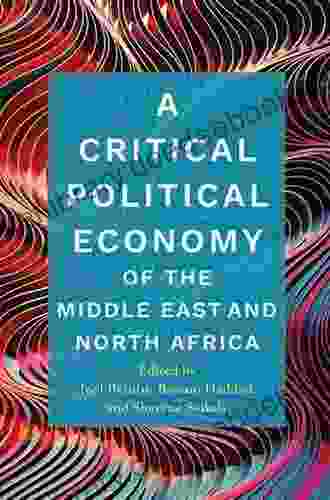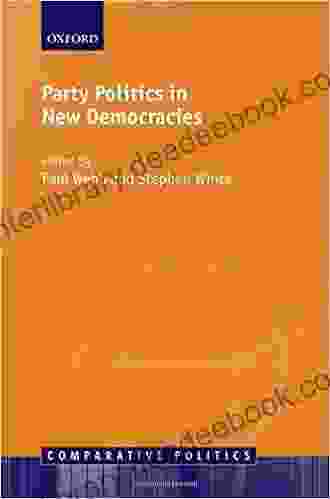Party Politics in New Democracies: Comparative Perspectives and Emerging Trends

The emergence of new democracies has brought with it a renewed interest in party politics. This interest is due to the pivotal role that political parties play in democratic societies. In new democracies, political parties serve as essential vehicles for political representation, interest articulation, and governance. As such, understanding the nature and dynamics of party politics in new democracies is crucial for comprehending the challenges and prospects of democratic consolidation.
This article will provide a comparative overview of party politics in new democracies, examining the various factors that shape party system development, the challenges faced by political parties, and the impact of party politics on democratization.
5 out of 5
| Language | : | English |
| File size | : | 5340 KB |
| Text-to-Speech | : | Enabled |
| Screen Reader | : | Supported |
| Word Wise | : | Enabled |
| Print length | : | 384 pages |
| Lending | : | Enabled |
Factors Shaping Party System Development
The development of party systems in new democracies is influenced by a complex interplay of factors, including:
- Historical legacy: The pre-democratic political culture and institutions can shape the emergence and evolution of party systems.
- Electoral system: The electoral system used in new democracies can have a significant impact on the number and strength of political parties.
- Social cleavages: Pre-existing social divisions, such as ethnic, religious, or economic cleavages, can contribute to the formation of political parties based on these identities.
- Economic development: The level of economic development in a new democracy can influence the emergence of party systems and the types of parties that develop.
- International context: The geopolitical and economic environment surrounding a new democracy can influence its party system development, particularly in the case of neighboring countries with established party systems.
Challenges Faced by Political Parties
Political parties in new democracies often face a range of challenges, including:
- Weak institutionalization: Political parties in new democracies are often relatively weak and lack the resources and infrastructure of established parties in more developed democracies.
- Internal factionalism: Parties in new democracies may be prone to internal divisions and factionalism, which can weaken their ability to act cohesively.
- Patronage and corruption: Political parties in new democracies may be susceptible to patronage networks and corruption, which can undermine their legitimacy and public support.
- External interference: Parties in new democracies may face pressure and interference from external actors, such as neighboring states or international organizations.
- Limited resources: Parties in new democracies often have limited access to financial and organizational resources, which can hinder their ability to mobilize voters and compete effectively in elections.
Impact of Party Politics on Democratization
Party politics can have a significant impact on the democratization process in new democracies. On the one hand, political parties can contribute to democratic consolidation by:
- Mobilizing citizens: Parties provide a means for citizens to participate in the political process and hold governments accountable.
- Aggregating interests: Parties help to articulate and aggregate citizen demands, which can facilitate policy-making and reduce social conflict.
- Providing stability: Stable and well-institutionalized party systems can contribute to political stability and prevent autocratic backsliding.
On the other hand, party politics can also pose challenges to democratization in new democracies by:
- Polarization: Competitive party politics can lead to political polarization and divisions within society.
- Gridlock: Fragmented party systems and coalition governments can result in political gridlock and hamper effective governance.
- Abuse of power: Dominant parties in new democracies may be tempted to abuse their power and undermine democratic institutions.
Emerging Trends
In recent years, several emerging trends have been observed in party politics in new democracies, including:
- Party system fragmentation: Party systems in new democracies are becoming increasingly fragmented, with a proliferation of small and medium-sized parties.
- Personalization of politics: The rise of charismatic leaders and the use of mass media have contributed to the personalization of politics, with parties becoming more dependent on individual leaders.
- Populist parties: Populist parties, which appeal to voters' fears and frustrations, have emerged in many new democracies, challenging traditional party systems.
- Online activism: The use of social media and online platforms has given rise to new forms of political mobilization and party activism.
- Internationalization of party politics: Parties in new democracies are increasingly involved in international networks and alliances, which can influence their domestic orientations and policy priorities.
Party politics in new democracies is a complex and dynamic phenomenon, shaped by a multitude of factors. Political parties serve as essential actors in democratic societies, providing representation, articulating interests, and facilitating governance. However, parties in new democracies face challenges such as weak institutionalization, internal factionalism, and external interference, which can affect their ability to contribute effectively to democratic consolidation.
Emerging trends, such as party system fragmentation and the personalization of politics, are reshaping the nature of party politics in new democracies. These trends have implications for the stability and effectiveness of democratic institutions and processes. Understanding the dynamics of party politics in new democracies is therefore crucial for developing strategies to promote democratic consolidation and strengthen democratic governance.
References
- Mainwaring, S. & Scully, T. (1995). Building Democratic Institutions: Party Systems in Latin America.
- Carothers, T. (2002). The End of the Transition Paradigm.
- Levitsky, S. & Way, L. (2010). Competitive Authoritarianism: Hybrid Regimes After the Cold War.
- Schedler, A. (2013). The Logic of Electoral Politics: A Comparative Perspective.
- Brubaker, R. (2020). Populism and Nationalism: A Comparative Perspective.
5 out of 5
| Language | : | English |
| File size | : | 5340 KB |
| Text-to-Speech | : | Enabled |
| Screen Reader | : | Supported |
| Word Wise | : | Enabled |
| Print length | : | 384 pages |
| Lending | : | Enabled |
Do you want to contribute by writing guest posts on this blog?
Please contact us and send us a resume of previous articles that you have written.
 Novel
Novel Page
Page Chapter
Chapter Genre
Genre Reader
Reader Library
Library Bookmark
Bookmark Foreword
Foreword Footnote
Footnote Scroll
Scroll Codex
Codex Tome
Tome Biography
Biography Autobiography
Autobiography Reference
Reference Encyclopedia
Encyclopedia Dictionary
Dictionary Thesaurus
Thesaurus Character
Character Resolution
Resolution Catalog
Catalog Card Catalog
Card Catalog Borrowing
Borrowing Stacks
Stacks Archives
Archives Periodicals
Periodicals Research
Research Lending
Lending Reserve
Reserve Academic
Academic Journals
Journals Rare Books
Rare Books Literacy
Literacy Study Group
Study Group Thesis
Thesis Storytelling
Storytelling Awards
Awards Reading List
Reading List Book Club
Book Club Textbooks
Textbooks Kate Stayman London
Kate Stayman London Justin Mcroberts
Justin Mcroberts Jan Cerney
Jan Cerney Phillip G Henderson
Phillip G Henderson Dan Mccollam
Dan Mccollam Bruce Riedel
Bruce Riedel Dan Millman
Dan Millman Heatherly Bell
Heatherly Bell Lindsay Locraft
Lindsay Locraft Testament
Testament David Ml Ricci
David Ml Ricci Elesa Zehndorfer
Elesa Zehndorfer Lynn K Hall
Lynn K Hall Marty Fort
Marty Fort Nikita Nain
Nikita Nain Koni Scavella
Koni Scavella John Lucas
John Lucas Oakley Dean Baldwin
Oakley Dean Baldwin Paula Steel
Paula Steel Benjamin Netanyahu
Benjamin Netanyahu
Light bulbAdvertise smarter! Our strategic ad space ensures maximum exposure. Reserve your spot today!

 Rubén DaríoTraditions and Hearthside Stories of West Cornwall Volume: A Journey into the...
Rubén DaríoTraditions and Hearthside Stories of West Cornwall Volume: A Journey into the... Enrique BlairFollow ·11k
Enrique BlairFollow ·11k Terry BellFollow ·14.2k
Terry BellFollow ·14.2k Gene PowellFollow ·19.5k
Gene PowellFollow ·19.5k Hayden MitchellFollow ·3.4k
Hayden MitchellFollow ·3.4k Shane BlairFollow ·15.1k
Shane BlairFollow ·15.1k Roberto BolañoFollow ·17.6k
Roberto BolañoFollow ·17.6k Curtis StewartFollow ·16.8k
Curtis StewartFollow ·16.8k Jeremy CookFollow ·2.1k
Jeremy CookFollow ·2.1k

 Bo Cox
Bo CoxDiscover the Enchanting Allure of Collingwood, Ontario,...
Nestled amidst the breathtaking landscape of...

 Ralph Ellison
Ralph EllisonThe Street of Clocks Poems: A Poetic Journey Through Time
Welcome to The Street...

 Dwight Blair
Dwight BlairCritical Political Economy of the Middle East and North...
The Middle East and...

 Deion Simmons
Deion SimmonsPerfect Strategies For Painting Amazing Marine Creatures...
Gouache is a...

 Hugh Bell
Hugh BellThe American Republic: Constitution, Tendencies, and...
The American Republic,...
5 out of 5
| Language | : | English |
| File size | : | 5340 KB |
| Text-to-Speech | : | Enabled |
| Screen Reader | : | Supported |
| Word Wise | : | Enabled |
| Print length | : | 384 pages |
| Lending | : | Enabled |












